English_content
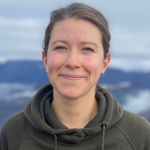 Graduated in Sciences and Technologies for Environment and Landscape at the University of Milano Bicocca, I am currently a PhD candidate in Polar Sciences at Ca' Foscari University of Venice. My research project focuses on water isotopes analysis of surface snow and Antarctic ice cores for reconstructing past temperatures. I have collaborated with CNR-ISP in Venice on developing Continuous Flow Analysis coupled with Cavity Ring Down Spectrometer system for continuous chemical and isotopic analysis. Additionally, I have contributed to instrument management and maintenance at the Dirigibile Italia station in Svalbard (Ny-Ålesund) during the winter season, and participated in the Ice Memory project by analyzing an alpine ice core. Currently, I am affiliated with CNR-ISP for cutting the Antarctic ice core retrieved from Little Dome C through the Beyond EPICA project.
Graduated in Sciences and Technologies for Environment and Landscape at the University of Milano Bicocca, I am currently a PhD candidate in Polar Sciences at Ca' Foscari University of Venice. My research project focuses on water isotopes analysis of surface snow and Antarctic ice cores for reconstructing past temperatures. I have collaborated with CNR-ISP in Venice on developing Continuous Flow Analysis coupled with Cavity Ring Down Spectrometer system for continuous chemical and isotopic analysis. Additionally, I have contributed to instrument management and maintenance at the Dirigibile Italia station in Svalbard (Ny-Ålesund) during the winter season, and participated in the Ice Memory project by analyzing an alpine ice core. Currently, I am affiliated with CNR-ISP for cutting the Antarctic ice core retrieved from Little Dome C through the Beyond EPICA project.
 PhD student in Polar Sciences at Ca' Foscari University of Venice, where he previously obtained a Master's Degree in Environmental Sciences. His research project aims to understand if in the recent period Svalbard has really changed their climatic regime defining the potential associated consequences.
PhD student in Polar Sciences at Ca' Foscari University of Venice, where he previously obtained a Master's Degree in Environmental Sciences. His research project aims to understand if in the recent period Svalbard has really changed their climatic regime defining the potential associated consequences.
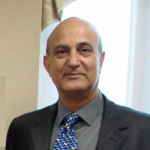 Since 1990 he is full professor of Ecology at the Faculty of Science of the University of Messina (Italy). General Secretary in the following NATO courses coordinated by Dr Trevor Platt, Halifax, Canada: (a) Lipari Island, Italy (12-24 October 1980) on Physiological ecology of Phytoplankton, (b) Bombannes (Bordeaux, France 12-20 May 1982) on Flows of energy and materials in marine ecosyistems: theory and practice, (c) S. Miniato, Italy (1-7 October 1985) on Physiological Ecology of photosynthetic Picopl9ankton in the Ocean. From 1990 to 2002, Italian Delegate to the Scientific Commission of the CCAMLR (Commission for the Conservation of Antarctic Marine Living Resources, Hobart (Tasmania, Australia). Over 60 months accumulated research experience at sea, including the following PNRA Italian Antarctic Expeditions as Principal Investigator: III Exp. (Terra Nova Bay Ecosystem,1987-88), V (South Pacific Sector,1989-90), X ROSSMIZE (Ross Sea Marginal Ice Zone Ecology,1994-95), XIII PIPEX (Pack Ice Plankton Expedition,1997-98), XV PIED (Pack Ice Ecosystem Dynamics 1999-2000), XX SEAROWS (Sea ice Ecology in the Antarctic: ROss and Weddell Seas) on the Polar Queen, Cariboo, Italica (1987-2002), Peri-Antarctic Oceanographic Expeditions in the Strait of Magellan I (1991) and II (1995), and one Arctic canadian cruise by N/R Hudson (1980). He has been Scientific Responsible of the Operative Unit Zooplankton and Micronekton in the following European projects: VECTOR, RITMARE, COCONET, MARINE STRATEGY. From 1968 to now, his research activity has been continuously addressed to issues on the zooplankton and micronekton ecology and biodiversity. Its main fields of study concern: (a) spatio-temporal distribution and daily vertical migrations (DVM) of marine zooplankton and micronekton communities in the Mediterranean and Polar ecosystems, in relation to the physical, chemical and biological water mass structure) (b) brackish environments functioning and biological response to stressor variables, (c) functioning of the coastal and pelagic food chain, with particular regard to the role of euphausiid and mesopelagic fish in the Deep Scattering Layer (DSL) (d) zooplankton role in the carbon cycle, (e) particles size spectrum (OPC) in the study of aquatic ecosystems (f) effects of climate change on the biology and ecology of Antarctic sea-ice and free water zooplankton communities. During 18 PNRA Antarctic expeditions (1987-2018) in Terra Nova Bay, Ross Sea and South Pacific Sector in free water and pack-fast-ice he collected about 6000 samples which are part of the zooplankton and micronekton collection laboratory of the University of Messina. In addition to the classic mesozooplankton and micronekton such as WP2, Indian Ocean Standard Net (IOSN), Bongo 40, IKMT, PHN, advanced electronic multinet are part of its field instrumentation such as BIONESS (1 m2) with 12 nets, MININESS (0.25 m2) with 10 nets 200, 500 and 1000 um, MICRONESS with 4 100 um nets, equipped with a multiparametric probe seabird 11 plus, fluorescence sensor and Optical Plankton Counter (OPC).
Since 1990 he is full professor of Ecology at the Faculty of Science of the University of Messina (Italy). General Secretary in the following NATO courses coordinated by Dr Trevor Platt, Halifax, Canada: (a) Lipari Island, Italy (12-24 October 1980) on Physiological ecology of Phytoplankton, (b) Bombannes (Bordeaux, France 12-20 May 1982) on Flows of energy and materials in marine ecosyistems: theory and practice, (c) S. Miniato, Italy (1-7 October 1985) on Physiological Ecology of photosynthetic Picopl9ankton in the Ocean. From 1990 to 2002, Italian Delegate to the Scientific Commission of the CCAMLR (Commission for the Conservation of Antarctic Marine Living Resources, Hobart (Tasmania, Australia). Over 60 months accumulated research experience at sea, including the following PNRA Italian Antarctic Expeditions as Principal Investigator: III Exp. (Terra Nova Bay Ecosystem,1987-88), V (South Pacific Sector,1989-90), X ROSSMIZE (Ross Sea Marginal Ice Zone Ecology,1994-95), XIII PIPEX (Pack Ice Plankton Expedition,1997-98), XV PIED (Pack Ice Ecosystem Dynamics 1999-2000), XX SEAROWS (Sea ice Ecology in the Antarctic: ROss and Weddell Seas) on the Polar Queen, Cariboo, Italica (1987-2002), Peri-Antarctic Oceanographic Expeditions in the Strait of Magellan I (1991) and II (1995), and one Arctic canadian cruise by N/R Hudson (1980). He has been Scientific Responsible of the Operative Unit Zooplankton and Micronekton in the following European projects: VECTOR, RITMARE, COCONET, MARINE STRATEGY. From 1968 to now, his research activity has been continuously addressed to issues on the zooplankton and micronekton ecology and biodiversity. Its main fields of study concern: (a) spatio-temporal distribution and daily vertical migrations (DVM) of marine zooplankton and micronekton communities in the Mediterranean and Polar ecosystems, in relation to the physical, chemical and biological water mass structure) (b) brackish environments functioning and biological response to stressor variables, (c) functioning of the coastal and pelagic food chain, with particular regard to the role of euphausiid and mesopelagic fish in the Deep Scattering Layer (DSL) (d) zooplankton role in the carbon cycle, (e) particles size spectrum (OPC) in the study of aquatic ecosystems (f) effects of climate change on the biology and ecology of Antarctic sea-ice and free water zooplankton communities. During 18 PNRA Antarctic expeditions (1987-2018) in Terra Nova Bay, Ross Sea and South Pacific Sector in free water and pack-fast-ice he collected about 6000 samples which are part of the zooplankton and micronekton collection laboratory of the University of Messina. In addition to the classic mesozooplankton and micronekton such as WP2, Indian Ocean Standard Net (IOSN), Bongo 40, IKMT, PHN, advanced electronic multinet are part of its field instrumentation such as BIONESS (1 m2) with 12 nets, MININESS (0.25 m2) with 10 nets 200, 500 and 1000 um, MICRONESS with 4 100 um nets, equipped with a multiparametric probe seabird 11 plus, fluorescence sensor and Optical Plankton Counter (OPC).
Research results are documented in more than 240 papers on national and international peer journals. Editor of these books: Atlas of Marine Zooplankton Strait of Magellan I Copepods (1995) and II Amphipods, Mysids, Euphausiids, Ostracods, Chaetognaths, Springer Verlag (1996); Ross Sea Ecology, Springer Verlag 2000; Mediterranean Ecosystems Structure and Processes, Springer Verlag (2001). Editor of the Research Topic "Ecology of Marine Zooplankton and Micronekton in Polar and Sub-Polar Areas” in Frontiers in Marine Biology (2023-2024).
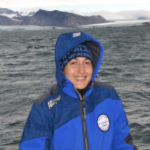 2016-2019: Master Degree in Marine Biology (110/110 cum laude) at the Alma Mater Studiorum University of Bologna - Ravenna Campus. Thesis title: "Bioaccumulation of legacy and emerging contaminants in tuna species".
2016-2019: Master Degree in Marine Biology (110/110 cum laude) at the Alma Mater Studiorum University of Bologna - Ravenna Campus. Thesis title: "Bioaccumulation of legacy and emerging contaminants in tuna species".
2020-in progress: PhD in Polar Science at Ca' Foscari University of Venice. My PhD project focuses on the analysis of persistent organic pollutants (regulated and emerging) in marine sediment cores collected in the Kongsfjorden-Krossfjorden fjord system (Svalbard Archipelago, Arctic), in order to: 1) evaluate the concentration levels and temporal trends of target contaminants in the sediment cores; 2) understand the temporal variability and fluxes of contaminants in the Arctic marine environment; and 3) define the sources of contamination in the investigation area.
In 2021 I spent two months (from the end of August to the end of October) at the Arctic Station 'Dirigibile Italia' in Ny-Ålesund, during which I took part both in the sampling activities of the sediment cores that were analysed for my PhD project, and in the management activities of the research station, working together with the station leader in charge at the time. In 2022 I spent 20 days (September) in Ny-Ålesund, thanks to an Arctic Field Grant, during which I sampled surface marine sediments in Kongsfjorden and Krossfjorden.
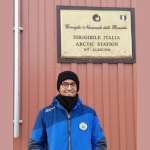 Graduated in Analysis and Management of the Environment from the University of Bologna, he began his collaboration with the Institute of Polar Sciences in 2019, conducting a study on identifying biomass burning events in Ny-Ålesund between 2010 and 2020. Currently a PhD student in Polar Sciences at Ca' Foscari University of Venice, he works at the ISP in Bologna. He mainly focuses on studying the optical and physical properties of atmospheric particulate matter, with a special focus on the Arctic region. He uses passive techniques like solar and lunar photometry, combining them with in-situ measurements of the scattering and absorption coefficients of solar radiation by aerosols.
Graduated in Analysis and Management of the Environment from the University of Bologna, he began his collaboration with the Institute of Polar Sciences in 2019, conducting a study on identifying biomass burning events in Ny-Ålesund between 2010 and 2020. Currently a PhD student in Polar Sciences at Ca' Foscari University of Venice, he works at the ISP in Bologna. He mainly focuses on studying the optical and physical properties of atmospheric particulate matter, with a special focus on the Arctic region. He uses passive techniques like solar and lunar photometry, combining them with in-situ measurements of the scattering and absorption coefficients of solar radiation by aerosols.
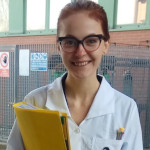 Got her Bachelor’s degree in Animal Care at the University of Padova with a thesis on Caffeine-induced Changes in a shoal behaviour of Tiger Barb (Puntigrus tetrazona). During her studies went to the University of South Bohemia, Institute of Complex Systems FFPW to participate in a project on Changes in shoal behaviour of aquarium fish in the presence of contaminants. Afterwards obtained her Master’s degree in Marine Sciences at the University of Milan-Bicocca with a thesis Picophytoplankton dynamics in the Northern Adriatic Sea (Gulf of Trieste). During the course of her studies went to Thudufushi, Maldives as a Marine Biologist. Moreover, did an experience at The National Institute of Oceanography and Applied Geophysics – OGS (Trieste) using optical (flow cytometry), molecular, and bioinformatics techniques for the study of planktonic microbes in the Gulf of Trieste and Venice. Currently works at the Institute of Polar Sciences (ISP-CNR) in Messina with a research project HALOVITA: anaerobic sulfur-respiring extreme halophilic archaea as model organisms for studying the criteria for a claim of active life detection.
Got her Bachelor’s degree in Animal Care at the University of Padova with a thesis on Caffeine-induced Changes in a shoal behaviour of Tiger Barb (Puntigrus tetrazona). During her studies went to the University of South Bohemia, Institute of Complex Systems FFPW to participate in a project on Changes in shoal behaviour of aquarium fish in the presence of contaminants. Afterwards obtained her Master’s degree in Marine Sciences at the University of Milan-Bicocca with a thesis Picophytoplankton dynamics in the Northern Adriatic Sea (Gulf of Trieste). During the course of her studies went to Thudufushi, Maldives as a Marine Biologist. Moreover, did an experience at The National Institute of Oceanography and Applied Geophysics – OGS (Trieste) using optical (flow cytometry), molecular, and bioinformatics techniques for the study of planktonic microbes in the Gulf of Trieste and Venice. Currently works at the Institute of Polar Sciences (ISP-CNR) in Messina with a research project HALOVITA: anaerobic sulfur-respiring extreme halophilic archaea as model organisms for studying the criteria for a claim of active life detection.
 Bachelor’s degree in Geological Science (University of Trieste), master’s degree in Geoscience (University of Trieste), PhD in Earth Sciences (University of Pisa). Current position: research fellow at Instituto of Polar Science of the CNR (CNR-ISP) in Bologna. Previously research fellow at the University of Trieste and at the National Institute of Oceanography and Applied Geophysical. My research concerns the study of marine polar diatom.
Bachelor’s degree in Geological Science (University of Trieste), master’s degree in Geoscience (University of Trieste), PhD in Earth Sciences (University of Pisa). Current position: research fellow at Instituto of Polar Science of the CNR (CNR-ISP) in Bologna. Previously research fellow at the University of Trieste and at the National Institute of Oceanography and Applied Geophysical. My research concerns the study of marine polar diatom.
Scopus :Author ID:57219626464 ![]() https://orcid.org/0000-0002-4286-1699
https://orcid.org/0000-0002-4286-1699
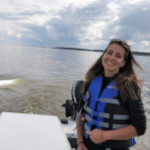 Bachelor’s degree in Physics and Advanced Technologies (University of Siena) and Master’s degree in Physics and Astrophysics (University of Florence). Erasmus+ study program (University of Bergen, Norway) and Erasmus+ traineeship program (Alfred Wegener Institute Helmholtz centre for polar and marine research (AWI) Bremerhaven, Germany). Acoustic data analyst for the Marine Environmental Quality program of Fisheries and Oceans Canada - Arctic region (DFO). PhD candidate at the University of Manitoba (Winnipeg, Canada) studying the impacts of climate change and vessel underwater noise on marine mammals in the Canadian Arctic using passive acoustic monitoring. Currently working for the Institute of Polar Sciences (CNR – ISP) of Venezia Mestre with the role of Station Leader of the Italian Arctic station Dirigibile Italia in Ny-Ålesund, Svalbard.
Bachelor’s degree in Physics and Advanced Technologies (University of Siena) and Master’s degree in Physics and Astrophysics (University of Florence). Erasmus+ study program (University of Bergen, Norway) and Erasmus+ traineeship program (Alfred Wegener Institute Helmholtz centre for polar and marine research (AWI) Bremerhaven, Germany). Acoustic data analyst for the Marine Environmental Quality program of Fisheries and Oceans Canada - Arctic region (DFO). PhD candidate at the University of Manitoba (Winnipeg, Canada) studying the impacts of climate change and vessel underwater noise on marine mammals in the Canadian Arctic using passive acoustic monitoring. Currently working for the Institute of Polar Sciences (CNR – ISP) of Venezia Mestre with the role of Station Leader of the Italian Arctic station Dirigibile Italia in Ny-Ålesund, Svalbard.
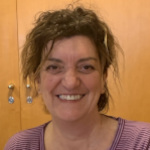 Graduated in Chemistry in 1993, obtained a PhD in 1997, she has been a senior technologist at ISPRA since 2021 and a technologist since 2005. Specializing in the chemical contamination of freshwater and marine environments, sediments, and soil, over the years, she has carried out numerous activities, including chemical and ecotoxicological laboratory work aimed at developing analytical methodologies and environmental indicators. She has also been involved in fieldwork, including participation in four expeditions to Antarctica, two of which she coordinated the project personnel. Her activities also encompass training, processing and validating chemical data from environmental monitoring, and providing support to ministries and other entities.
Graduated in Chemistry in 1993, obtained a PhD in 1997, she has been a senior technologist at ISPRA since 2021 and a technologist since 2005. Specializing in the chemical contamination of freshwater and marine environments, sediments, and soil, over the years, she has carried out numerous activities, including chemical and ecotoxicological laboratory work aimed at developing analytical methodologies and environmental indicators. She has also been involved in fieldwork, including participation in four expeditions to Antarctica, two of which she coordinated the project personnel. Her activities also encompass training, processing and validating chemical data from environmental monitoring, and providing support to ministries and other entities.
Currently, she manages and participates in environmental research activities related to the management of chemical contamination and the diffusion processes of contaminants, in line with the institutional activities of the Institute. In recent years, she has provided technical-scientific support for activities related to the collection and organization of databases related to the monitoring of different types of water, to be transmitted at the European level (EIONET Soe). She is the national representative (NRC) for Marine, coastal, and maritime issues at the European Environment Agency.
In past years, she has provided technical-scientific support for reporting activities related to the Nitrates Directive, activities related to the management and reclamation of some Sites of National Interest, the IPPC/AIA Commission, and the VIA Commission. For about 20 years, she has been involved in polar environment research, starting during her academic years and continuing to the present. She currently coordinates a Collaboration Agreement with the British Antarctic Survey (BAS). She is involved in several national and international research projects and has produced more than 80 refereed and non-refereed scientific publications.
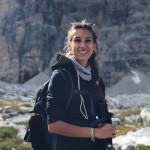 Environmental Scientist and PhD candidate in Polar Science, at Cà Foscari University of Venice.
Environmental Scientist and PhD candidate in Polar Science, at Cà Foscari University of Venice.
She graduated with a Bachelor's degree in Environmental Science and Technology from the University of Milano-Bicocca, interested in climate change, atmospheric chemistry and physics, driven by a desire to protect the Planet; she continued her studies, obtaining her MSc degree, with Honors, in Environmental Science and Technology from the University of Milano-Bicocca, with a thesis on paleoclimate reconstruction; studying eolian mineral dust trapped in the RICE, Antarctic ice core.
Currently a Ph.D. candidate in Polar Science at Cà Foscari University of Venice, with her research project she is working on atmospheric chemistry, studying the atmospheric heating rate in the Arctic due to Black Carbon, a crucial topic for the comprehension of the Arctic amplification phenomenon.
More...
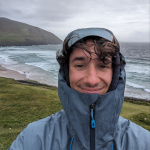 I am a Ph.D. candidate at the University of Milano-Bicocca in Milan, Italy.
I am a Ph.D. candidate at the University of Milano-Bicocca in Milan, Italy.
My background includes a bachelor's degree in Physics and Astrophysics from the University of Florence, followed by a master's degree in Physics of the Earth System at the University of Bologna.
My research focuses on snow and ice multispectral remote sensing, where I investigate the physical properties of the snowpack and the radiative effects that dust and algae have on it. Beyond my primary research, I am interested in drones, instrumentation, and atmospheric dynamics.
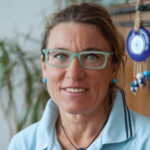 Graduated in Chemistry and Pharmaceutical Technologies in 1993, researcher at ISPRA since 2000. Head of the oceanography and Contamination of Aquatic Environments laboratory since 2009 at the ISPRA in Chioggia. My analytical expertise concerns the chemical characterization (elemental and isotopic) of dissolved, particulate and sedimentary organic substance in marine environments, transition waters and polar environments; analysis of contamination of water, sediments and organisms by organotin compounds; characterization of the stable isotopes of carbon and nitrogen in the trophic chain; analysis of dissolved nutrients in marine, transitional and polar waters. My activity focuses on the planning of the analytical activity required by the various institutional, national and European projects, in the evaluation of the quality of the data produced with the drafting of reports, field activities (boarding) and participation in institutional meetings and international conferences. In addition to my scientific activity, 70 international publications and 70 or more participations in conferences and posters, I am involved in terms of my chemical skills in national working groups and institutional roles, in particular as an expert and national representative in the established technical working groups at the European Commission and UNEP/MAP for the Barcelona Convention on the issue of contaminants since 2014. Since 2020 reference for Italy for WISE 6 -NRC for reporting activities.
Graduated in Chemistry and Pharmaceutical Technologies in 1993, researcher at ISPRA since 2000. Head of the oceanography and Contamination of Aquatic Environments laboratory since 2009 at the ISPRA in Chioggia. My analytical expertise concerns the chemical characterization (elemental and isotopic) of dissolved, particulate and sedimentary organic substance in marine environments, transition waters and polar environments; analysis of contamination of water, sediments and organisms by organotin compounds; characterization of the stable isotopes of carbon and nitrogen in the trophic chain; analysis of dissolved nutrients in marine, transitional and polar waters. My activity focuses on the planning of the analytical activity required by the various institutional, national and European projects, in the evaluation of the quality of the data produced with the drafting of reports, field activities (boarding) and participation in institutional meetings and international conferences. In addition to my scientific activity, 70 international publications and 70 or more participations in conferences and posters, I am involved in terms of my chemical skills in national working groups and institutional roles, in particular as an expert and national representative in the established technical working groups at the European Commission and UNEP/MAP for the Barcelona Convention on the issue of contaminants since 2014. Since 2020 reference for Italy for WISE 6 -NRC for reporting activities.
Since 2021, I have been participating in the Arctic Table at the Ministry of Foreign Affairs and International Cooperation (MAECI). National expert for the D4 and D8 descriptors in the Marine Strategy (MSFD) WGs and TSGs since 2017 in the European Expert Network on Contaminants group European Commission Joint Research Center (JRC).
Participation in several European projects MEDREGION (Support Mediterranean Member States towards the implementation of the Marine Strategy Framework Directive new GES Decision and programs of measures and contribute to regional/subregional cooperation), PNRA PROPOSE (Processes controlling the presence and distribution of pollutants in Ross Sea Area); HarmoNIA (Harmonization and Networking for contaminant assessment in the Ionian and Adriatic Seas), Interreg Program ADRION, European Marine Observation and Data EMODNET Chemistry Service Contract No. MARE/2012/10 – Lot 4 Chemistry; VECTOR LINE 6 The role of the Northern Adriatic continental shelf in Mediterranean carbon cycles (CARADRI); 2009 PNRA Trace metals in the Antarctic food web.
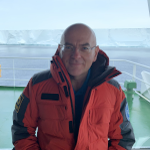 He comes from ENEA where he gained experience in administration, including being responsible for the administration of the Consortium for the Implementation of PNRA S.c.r.l. and R.U.P. for various procedures, and logistics activities. He had the opportunity to participate in some Antarctic campaigns at Mario Zucchelli Station and aboard the R/V Laura Bassi. In logistics since 2007, he had the responsibility of the ENEA office in Christchurch and the service contract with the shipping/customs agent in Hobart, as well as the management of air, sea and land shipments of PNRA related materials, also taking care of the customs aspects.
He comes from ENEA where he gained experience in administration, including being responsible for the administration of the Consortium for the Implementation of PNRA S.c.r.l. and R.U.P. for various procedures, and logistics activities. He had the opportunity to participate in some Antarctic campaigns at Mario Zucchelli Station and aboard the R/V Laura Bassi. In logistics since 2007, he had the responsibility of the ENEA office in Christchurch and the service contract with the shipping/customs agent in Hobart, as well as the management of air, sea and land shipments of PNRA related materials, also taking care of the customs aspects.
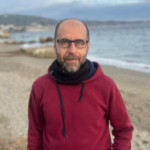 He obtained the PhD title in Environmental Sciences: Marine Environment and Resources (XXXIII Cycle) at the University of Messina in 2011 (2011). The main research interests concern the ecology of meso/macroplankton in transitional and marine environments and the management of fixed observation sites (buoys and oceanographic beacons) aimed at the acquisition of chemical-physical parameters and the biological characterization of the communities. His main skills and competences concern the knowledge of zooplankton sampling and analysis techniques, the use and development of measuring and sampling instruments of both the physical and biological component. He has participated in numerous oceanographic campaigns in the Mediterranean Sea and in long-term monitoring and research programs in marine and transitional environments. He is the author/co-author of over 20 publications in peer-reviewed journals and numerous technical reports. He is currently involved in the implementation of the oceanographic observatory on the Svalbard Islands.
He obtained the PhD title in Environmental Sciences: Marine Environment and Resources (XXXIII Cycle) at the University of Messina in 2011 (2011). The main research interests concern the ecology of meso/macroplankton in transitional and marine environments and the management of fixed observation sites (buoys and oceanographic beacons) aimed at the acquisition of chemical-physical parameters and the biological characterization of the communities. His main skills and competences concern the knowledge of zooplankton sampling and analysis techniques, the use and development of measuring and sampling instruments of both the physical and biological component. He has participated in numerous oceanographic campaigns in the Mediterranean Sea and in long-term monitoring and research programs in marine and transitional environments. He is the author/co-author of over 20 publications in peer-reviewed journals and numerous technical reports. He is currently involved in the implementation of the oceanographic observatory on the Svalbard Islands.
 Ministero dell'Universita e Ricerca
Ministero dell'Universita e Ricerca
Programma Ricerche Artico
Programma Nazionale di Ricerca in Antartide
 Ministero degli Affari Esteri e della Cooperazione Internazionale
Ministero degli Affari Esteri e della Cooperazione Internazionale
L'Italia e l’Artico
L’Italia e l’Antartide
CNR-ISP
National Research Council
Institute of Polar Sciences
c/o Scientific Campus - Ca' Foscari University Venice - Via Torino, 155 - 30172 VENEZIA MESTRE (VE)
Phone: +39 041 2348547 - E-mail: protocollo.isp AT pec.cnr.it
Fax: +39 041 2348 549 - Codice Fiscale: 80054330586 - P.I.:02118311006
Unless otherwise indicated, the content of this site is licensed : Attribution Non Commercial Share Alike 4.0 International (CC BY-NC-SA 4.0)
Privacy policy e Cookie policy - Transparent administration (CNR)








